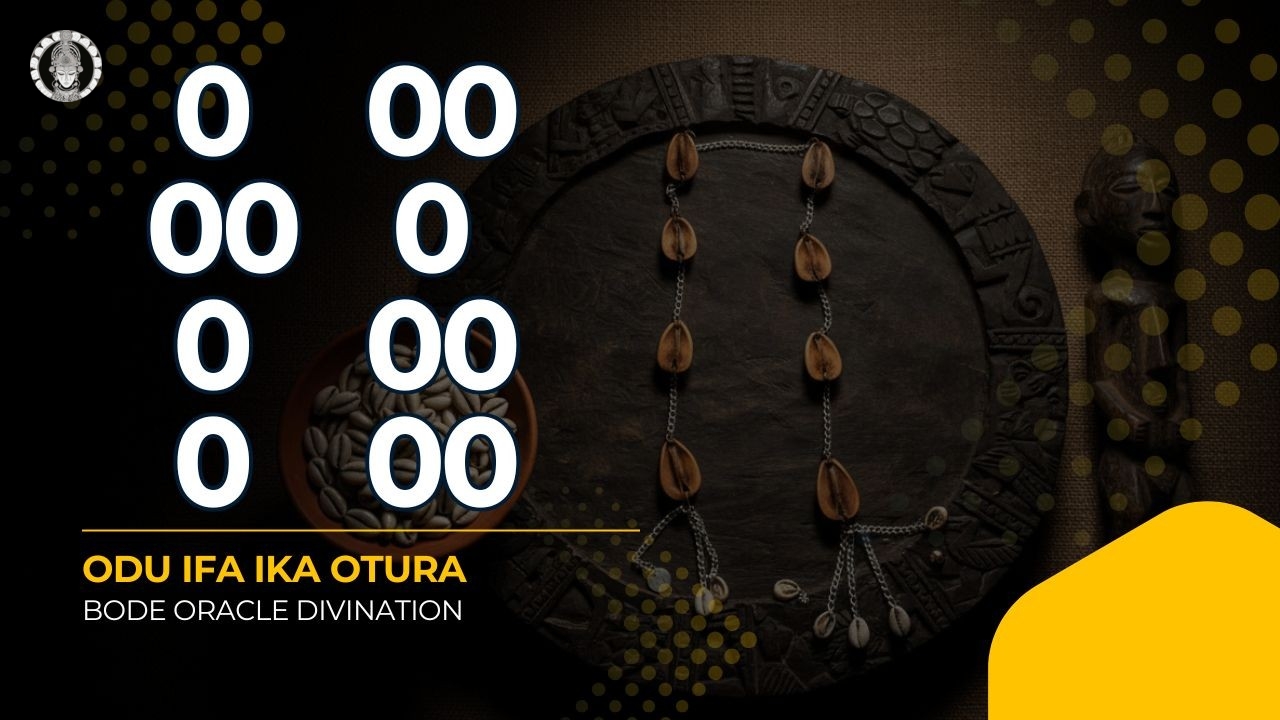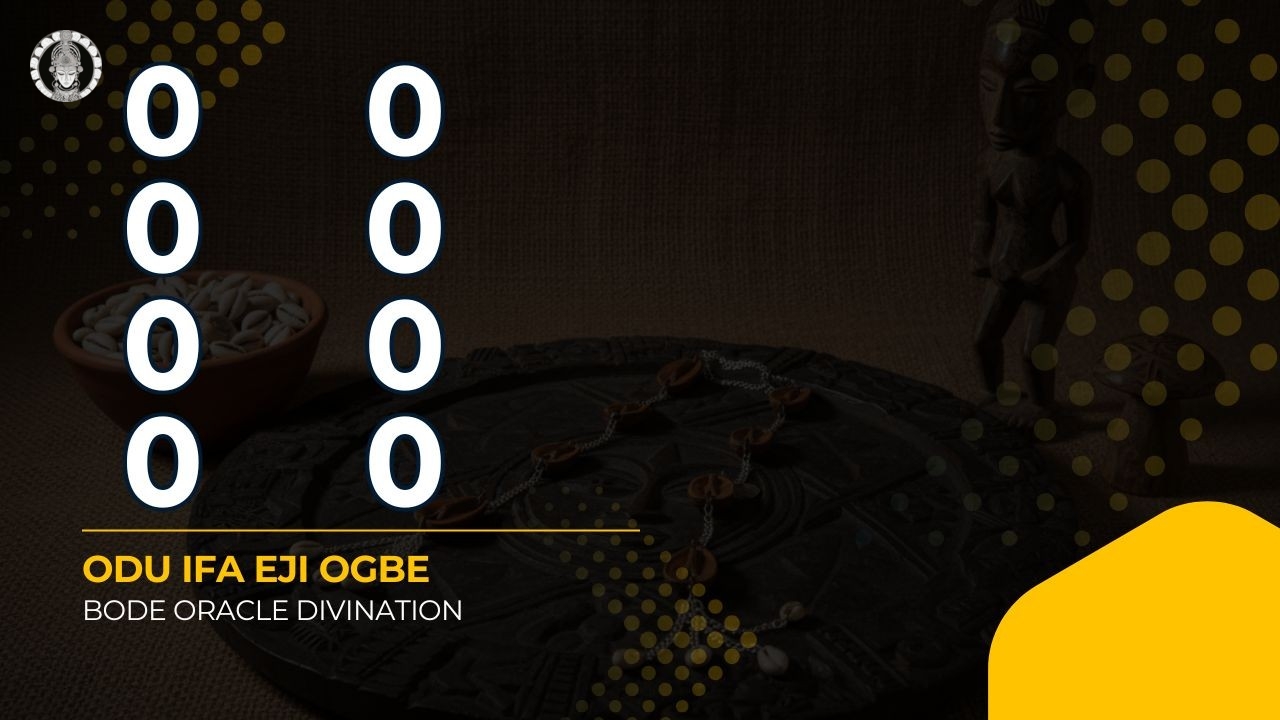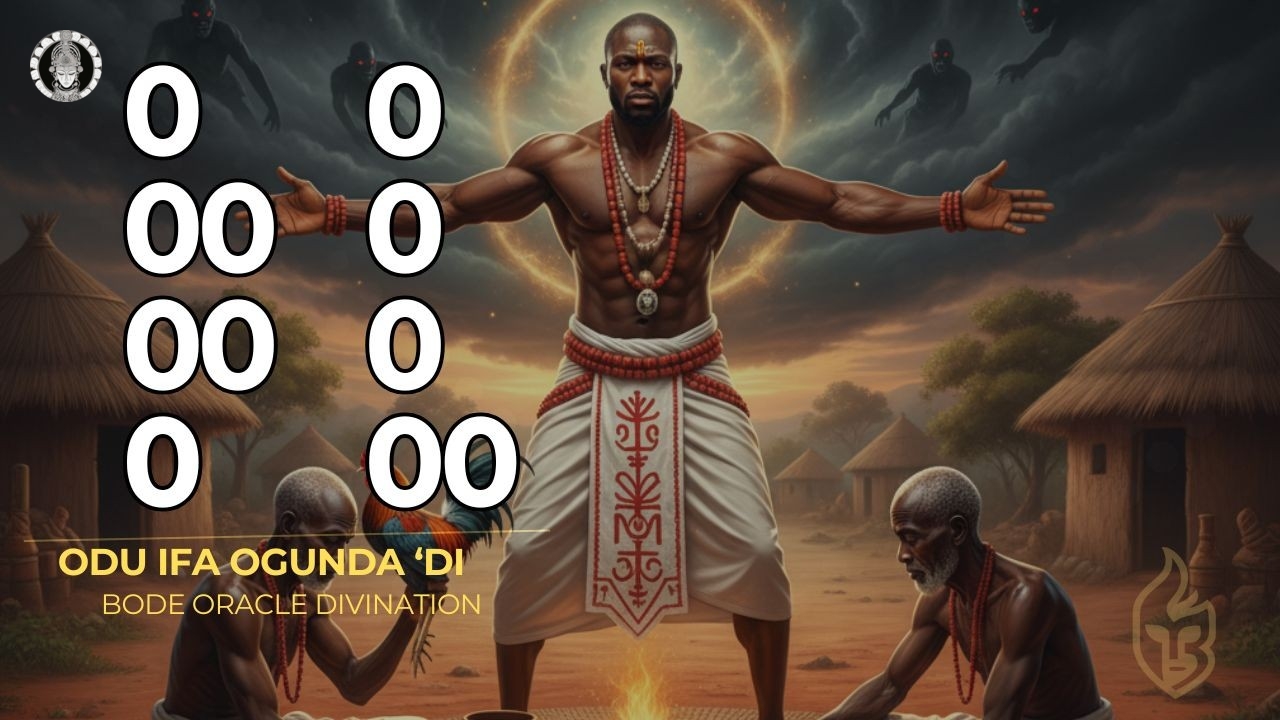Introduction to Odu Ifa Ogunda Obara (Ogunda Di)
Odu Ifa Ogunda Obara, also known as Ogunda Di or Ogunda Odi, represents one of the 256 sacred divination signs in the Ifa corpus. This powerful warrior Odu carries profound messages about achieving decisive victory over enemies, attaining spiritual immortality and longevity, securing divine protection from bondage and enslavement, receiving blessings in marriage relationships, and protecting children from the devastation of war and conflict.
The name itself speaks to the Odu's character: Ogunda represents the energy of Ogun, the warrior deity of iron, battle, and technological advancement, while Obara (or Di/Odi) brings the element of binding, securing, and establishing permanent spiritual positions. Together, they create a divination sign that teaches how to wage successful spiritual warfare, bind victory to oneself, and establish unshakeable spiritual foundations that even death cannot disturb.
Throughout the divinations contained in Ogunda Obara, we encounter recurring themes of warfare and protection, sacrifice and medicine, immortality and transformation. Each story demonstrates that proper spiritual preparation transforms potential victims into victors, converts slaves into sovereigns, and changes mortality into immortality. For comprehensive understanding of the 16 Odu Ifa and their meanings, explore our detailed guide.
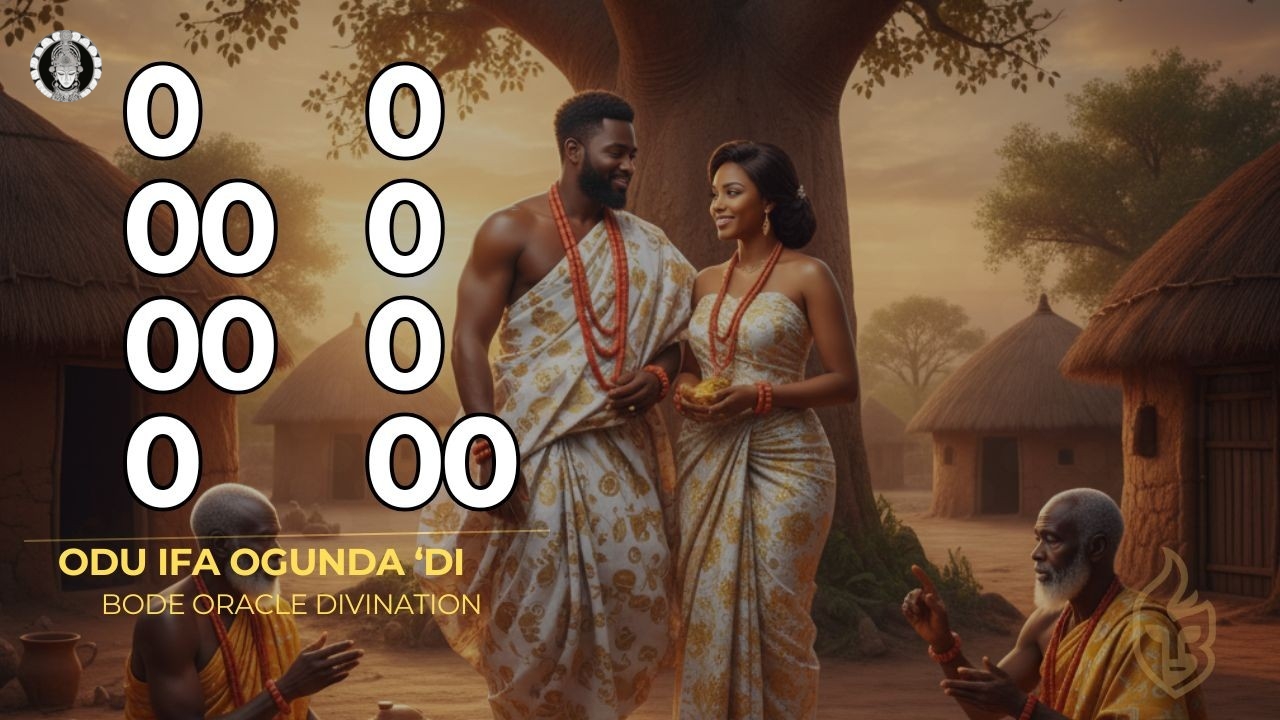
Ifa Divination for Esinkin: The Blessing of Immortality and Victory Over Enemies
Understanding the Quest for Immortality
This divination from Ogunda Obara addresses one of humanity's most ancient aspirations: the conquest of death itself. Esinkin Ogbede Gbe was coming to earth with the blessing of immortality (alainiku—literally "without death"). This reveals a profound spiritual principle: some souls are destined for extended lifespans or spiritual immortality, but even these pre-ordained blessings require proper sacrifice to manifest and be maintained.
The divination also addresses a more immediately practical concern: the presence of numerous enemies seeking to harm or destroy the person. In Yoruba spiritual understanding, enemies are not merely human adversaries but can include malevolent spiritual forces, negative ancestral influences, jealous contemporaries, and even one's own destructive habits or thoughts. Ogunda Obara provides the spiritual technology to overcome all such opposition.
The Sacred Verse
Bata gbe bule fohun oran
Adifafun esinkin ogbede gbe
Igba ti n raye alainiku
Ebo won ni o se
O si gbebo nibe o rubo
Nje emon joya o lo oya abi owo pon npon
Emon joya o lo
Oya abese joya o lo
Oya abese ponpon
Emo joya o lo.
English Translation
The Bata drum lifts its voice with a loud and challenging sound
Ifa divination was cast for Esinkin Ogbede Gbe
When coming to earth with immortality
He was asked to offer sacrifice
And he complied.
Therefore, do not let the Oya rat depart—the one with large hands
Do not let the Oya rat depart
The one with large legs
Do not let the Oya rat depart.
The Symbolism of the Bata Drum
The opening imagery of the Bata drum making a loud and difficult sound is profoundly significant. The Bata is the sacred talking drum used primarily in the worship of Ogun (deity of iron and war) and Sango (deity of thunder and justice). Its loud, challenging sound announces the presence of warrior energy and the imminent manifestation of victory. In spiritual warfare, sound itself becomes a weapon—the loud proclamation of triumph demoralizes enemies and announces to the spiritual realm that a victor is present.
The Bata's voice is described as "difficult" (fohun oran), suggesting that the path to victory is not easy or comfortable. It requires the harsh, challenging work of spiritual warfare: consistent sacrifice, unwavering faith, and sometimes uncomfortable confrontation with forces that would prefer to operate in silence and darkness.
The Oya Rat: Symbol of Tenacity and Survival
The repeated refrain about the Oya rat with large hands and large legs carries multiple layers of meaning. The Oya rat represents survival ability, tenacity, resourcefulness, and the capacity to hold on to what one has gained. Its large hands symbolize the ability to grasp and maintain blessings firmly. Its large legs represent the strength to stand firm against opposition and to travel long distances (metaphorically, a long life) without tiring.
The insistence that this rat must not depart teaches that once victory and immortality are secured through proper sacrifice, they must be guarded vigilantly. The blessings achieved through Ogunda Obara are permanent only if one maintains spiritual practice and continues to "not let go" of what has been secured.
Prescribed Offerings (Ebo)
For victory over enemies and the blessing of longevity, Ifa prescribes a rooster (akuko), representing warrior energy and the announcement of victory; doves (eyele), bringing peace even amid warfare; a hen (aboadie), providing nurturing protection and multiplication of blessings; snails (igbin), symbolizing patience, persistence, and steady progress toward goals; and substantial money (opolopo owo), facilitating both the spiritual and practical dimensions of victory.
Modern Application for Contemporary Warriors
In contemporary times, this Odu speaks to anyone facing multiple adversaries or opposition: professionals dealing with workplace politics and competition, entrepreneurs facing business rivals, individuals experiencing family conflicts, or anyone sensing spiritual attack from unseen forces. The prescription is clear: perform the designated sacrifices to secure not just temporary victory but enduring triumph that extends throughout one's life. Learn more about Ogunda Obara divination practices on our dedicated page.
Ifa Divination for Wura (Gold): Securing a Blessed and Obedient Spouse
Understanding Marriage as Spiritual Partnership
This divination from Ogunda Obara addresses Wura (Gold), who is identified as the wife of Agboniregun (another name for Orunmila, the deity of wisdom and divination). The fact that even Orunmila's wife required divination and sacrifice before their marriage teaches a profound lesson: no union, no matter how spiritually significant or seemingly destined, succeeds without proper spiritual preparation.
The divination speaks to anyone contemplating marriage, revealing that the quality of one's spouse—their character, their spiritual destiny, and their compatibility—is not merely a matter of chance or social introduction but can be spiritually influenced and secured through proper sacrifice before the marriage occurs.
The Sacred Verse
Ogunda digbin o ku su jadi igere
Ajodi abi ara kaja
Adifafun wura
Tii se aya agboniregun
Ebo won ni won o se
O si gbebo nibe orubo
Nje baba lwo to gbofa
Abuwura ni kun
English Translation
Ogunda digbin survives the challenge of igere
Ajodi maintains bodily integrity
Ifa divination was cast for Wura (Gold)
Who would become the wife of Agboniregun
She was asked to offer sacrifice
And she complied.
Therefore, the great father who knows Ifa,
You are unique and well-informed.
The Promise of an Obedient and Destined Spouse
The outcome of this divination contains a promise that may sound controversial to modern sensibilities but reveals important spiritual principles about harmony in relationships. Ifa promises that after performing the prescribed sacrifice, the person will marry "a well-destined woman, and this woman will always do what she is instructed to do."
This is not about domination or submission in the problematic sense but about spiritual alignment and compatibility. A "well-destined" spouse is one whose ori (personal destiny) is compatible with yours, whose life path runs parallel to yours, and whose spiritual assignment complements rather than contradicts yours. The obedience spoken of refers to spiritual receptivity—the willingness to cooperate with divine guidance, to receive wisdom from one's partner, and to work in harmony rather than constant opposition.
In healthy Yoruba marriages, both partners are expected to offer guidance to each other based on their respective areas of wisdom and spiritual strength. The wife "obeys" when the husband speaks from genuine wisdom and spiritual insight; the husband "obeys" when the wife speaks from her own areas of spiritual authority. This is mutual respect and spiritual cooperation, not hierarchical domination.
The Importance of Pre-Marriage Spiritual Work
This divination emphasizes that the work of securing a blessed marriage must be done before the marriage occurs, not after problems have already manifested. Many people seek Ifa's help to fix troubled marriages, and while such intervention can help, it is far more effective to perform the proper spiritual work before entering the marriage, thereby attracting a compatible partner and establishing a solid spiritual foundation from the beginning.
Prescribed Offerings (Ebo)
For those seeking marriage or preparing for it, Ifa prescribes a hen (aboadie), representing the feminine principle, nurturing energy, and the creation of a peaceful home; a rooster (akuko), representing the masculine principle, protective energy, and family leadership; doves (eyele), bringing peace, harmony, and divine blessing to the union; and money (opolopo owo), facilitating both the spiritual preparation and the practical establishment of the marriage.
Modern Application for Relationships
In contemporary times, this Odu speaks to anyone contemplating serious relationships or marriage. It teaches that spiritual compatibility is more important than physical attraction, financial compatibility, or social approval. Those who receive this Odu should perform the prescribed rituals before committing to marriage, asking Ifa specifically to guide them to a partner whose destiny aligns with theirs and with whom they can build a spiritually harmonious union. For deeper understanding of Yoruba marriage customs and spiritual preparations, consult UNESCO documentation on Ifa traditions.
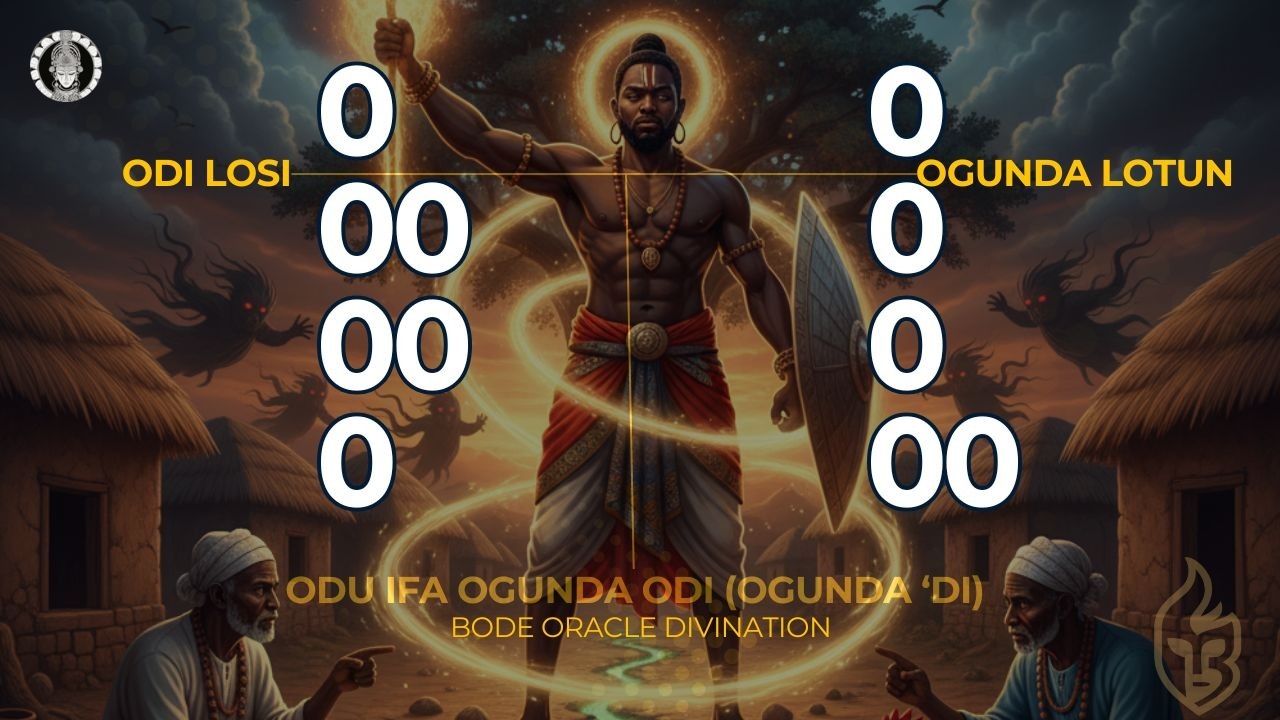
Ifa Divination for Orunmila: Liberation from Bondage and Spiritual Immortality
Confronting the Threat of Enslavement
This divination from Ogunda Obara addresses Orunmila himself—the deity of wisdom, divination, and destiny—on a day when he was told that people were planning to take him as a slave (eru). Even divine beings face threats in the physical world, and this story demonstrates that spiritual authority alone, without proper sacrifice and preparation, does not automatically protect against material dangers.
The theme of enslavement speaks to all forms of bondage: physical slavery and captivity, economic oppression and debt bondage, spiritual bondage to negative forces or addictions, psychological bondage to fear or trauma, and social bondage to systems that restrict freedom. Ogunda Obara provides the spiritual keys to liberation from all such forms of captivity.
The Sacred Verse
Ogunda di o gbadi
Ifa depo ogba epo oorigban nijadi
Adifafun orunmila
Nijo ti won ni awon o mun baba wa leru
Won ni o karagiri
Ebo ni won ni o se
O si gbebonibe o rubo
English Translation
Ogunda has arrived at a secure position
Ifa has reached a good place and no one can dispute it
Ifa divination was cast for Orunmila
On the day they said he would be taken as a slave
He was told to be vigilant
He was asked to offer sacrifice
And he complied.
The Dual Path of Sacrifice and Medicine
Orunmila's response to this threat reveals a sophisticated understanding of spiritual work. He declared: "When it is time for sacrifice, one must offer sacrifice. When it is time for medicine, one must use medicine." This teaches that spiritual protection operates on two complementary levels that must work together.
Sacrifice (ebo) addresses the spiritual dimension—appeasing or empowering spiritual forces, redirecting negative energy, and establishing divine protection. Medicine (ogun) addresses the practical, physical dimension—using herbal preparations, protective charms, and tangible interventions. Neither is sufficient alone. Those who rely only on sacrifice while neglecting practical precautions invite disaster. Those who rely only on material means while neglecting spiritual forces leave themselves vulnerable to attacks that operate beyond the physical realm.
The Metaphor of the Indestructible Mortar
The divination contains a powerful metaphor: "The rising and falling of the mortar cannot kill the mortar, and I have become the basket of children—no one can do anything against me." The mortar (used for grinding) endures constant pounding yet never breaks. Through proper sacrifice, the person becomes like this mortar—capable of enduring repeated attacks without being destroyed.
The image of becoming "the basket of children" suggests transformation into something universally valuable and protected. Just as a community protects its children's basket (containing the future generation), so too does the spiritual realm protect those who have properly secured their spiritual position through sacrifice.
The Promise of Comprehensive Protection
The divination concludes with a series of powerful declarations about what will not happen to those who offer sacrifice: Sudden death (iku) will not come by their way. Loss (ofo) will not visit their path. Illness (arun) will not afflict them. All negative forces (gbogbo ajogun) will not come near them.
Each declaration is followed by the curious phrase: "And the farewell of any person will never pass by the crab's house to ask the crab for water." This cryptic statement teaches that just as no one seeks water from a crab (a creature that lives in water but cannot provide it), so too will negative forces bypass those protected by this Odu—they will not even approach to make requests or test boundaries.
Prescribed Offerings (Ebo)
For protection from bondage and achievement of spiritual immortality, Ifa prescribes a rooster (akuko adie), representing vigilance, early warning, and the announcement of dawn (freedom from darkness); a broken pot (ikoko tolu nidi), symbolizing that which has been discarded by society but carries spiritual power; a useless basket (ajadi apere), representing transformation of the worthless into the valuable; and money (opolopo owo), facilitating the comprehensive spiritual work required.
The inclusion of broken and useless items is particularly significant. By offering what society deems worthless, the person symbolically offers their own vulnerable status (potentially enslaved, potentially destroyed) and receives in return invulnerability and freedom. This demonstrates the spiritual principle that what is weak in the material world can become powerful in the spiritual realm through proper consecration.
Modern Application for Liberation
In contemporary society, this Odu speaks to all who feel trapped or threatened with bondage: those in oppressive employment situations, individuals struggling with addiction or destructive patterns, people facing legal threats or incarceration, anyone experiencing economic desperation, or those feeling spiritually attacked. The prescription is clear: combine spiritual sacrifice with practical action, vigilance with faith, and transform your vulnerable position into an impregnable spiritual fortress. For scholarly research on Ifa divination systems, explore algebraic characterization of Ifa divination codes.
Ifa Divination for Irawosasa: Protecting Children from the Devastation of War
Understanding Spiritual Protection for the Next Generation
This divination from Ogunda Obara addresses Irawosasa, described as the firstborn of Eledumare (the Supreme Being). The fact that even the firstborn of the Divine requires sacrifice to be protected from war teaches a sobering lesson: no one is immune to conflict simply by virtue of their spiritual lineage or destined greatness. Even those born with divine favor must perform the necessary spiritual work to activate and maintain that protection.
The divination specifically addresses parents' concerns about their children being affected by war—whether literal military conflict, social violence, or the various forms of warfare that manifest in modern society: gang violence, school shootings, police brutality, or the psychological warfare of bullying and social media attacks.
The Sacred Verse
Igbo etile toun tegbin
Ona gbon seoun leja
Aso tia bafi ise ra
Toun tise ni gbo
Adifafun irawosasa
Tii se akobi eledumare bo
Ebo won ni o se
O si gbebo nibe orubo
Nje irawo sasa
Ogun o gbodo jorun
English Translation
The bush near the house is always full of dirt
It is the path leading to the forest that requires seriousness
The cloth bought with poverty
Becomes useless through poverty
Ifa divination was cast for Irawosasa
Who is the firstborn of Eledumare
He was asked to offer sacrifice
And he complied.
Therefore, Irawo Sasa,
War must not affect the good ones.
The Metaphors of Poverty and Preparedness
The opening verses contain layered metaphors about preparation and consequences. The bush near the house being full of dirt teaches that danger often lurks closest to home—the threats we face are not always distant but may be right in our neighborhood or community. The path to the forest requiring seriousness teaches that venturing into dangerous territories (metaphorically, life's challenges and conflicts) demands proper preparation and spiritual seriousness.
The image of cloth bought with poverty becoming useless through poverty reveals a vicious cycle: when we approach life's challenges from a position of spiritual poverty (lack of sacrifice, lack of spiritual investment), we obtain only weak and temporary solutions that quickly fail. But when we invest properly in spiritual preparation, even modest resources become powerful and enduring.
The Declaration: War Must Not Affect the Good
The conclusion of this divination contains a powerful spiritual decree: "Ogun o gbodo jorun"—war must not affect the good ones. This is not merely a wish but a spiritual pronouncement that, when backed by proper sacrifice, creates a protective barrier around innocent people, particularly children, preventing them from becoming casualties of conflicts they did not create.
In Yoruba cosmology, there is a recognition that war and conflict are sometimes necessary and unavoidable in the world, but there is also a strong principle that innocent people—especially children, the elderly, and those not involved in the conflict—should be protected. This divination activates that protection through ritual sacrifice.
Parental Responsibility for Children's Spiritual Protection
This divination emphasizes that parents bear spiritual responsibility for their children's protection. It is not enough to provide material necessities; parents must also perform the spiritual work necessary to shield their children from the various forms of warfare present in society. This includes not only offering prescribed sacrifices but also teaching children proper spiritual practices, instilling in them values that protect them from participating in violence, and maintaining a spiritually clean home environment.
Prescribed Offerings (Ebo)
For protecting children from war and conflict, Ifa prescribes a rooster (akuko adie), representing vigilance, protective aggression, and the masculine warrior energy that defends the vulnerable; and substantial money (opolopo owo), used both for the sacrifice itself and for practical measures to protect children from violence.
The prescription is notably simpler than others in Ogunda Obara, suggesting that the spiritual principle at work here is direct and focused: activate the protective warrior energy on behalf of the innocent, and provide the material resources necessary to keep children safe.
Modern Application for Child Protection
In contemporary times, this Odu speaks urgently to parents living in areas affected by violence: neighborhoods with gang activity, regions experiencing political or ethnic conflict, communities with high crime rates, or even schools where bullying and violence are prevalent. Parents receiving this divination should perform the prescribed sacrifice and combine it with practical measures: choosing safe routes for children, teaching awareness without inducing paralyzing fear, building community networks of protection, and advocating for systemic changes that reduce violence. Explore more wisdom from our collection of Ifa teachings.
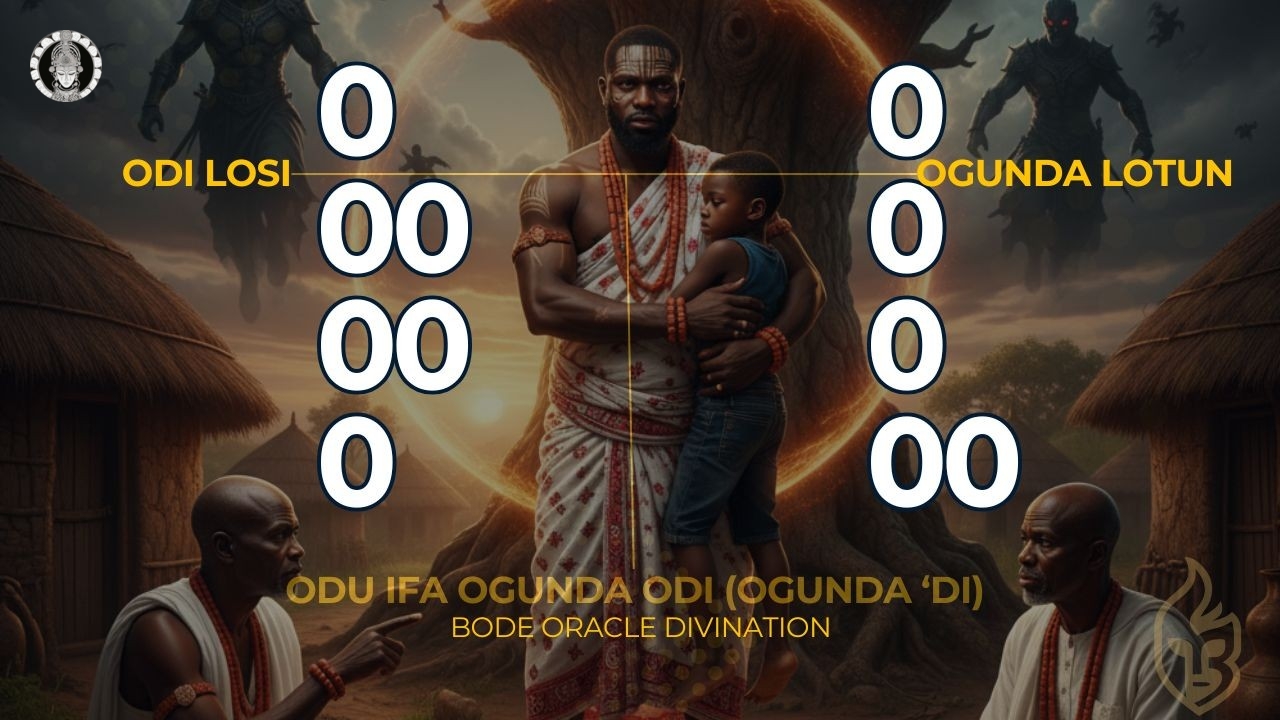
Akose and Spiritual Preparations of Ogunda Obara
Understanding Akose in Ifa Practice
Akose refers to spiritual preparations or medicinal formulations that combine herbal, animal, and sometimes mineral substances with spiritual invocations to produce specific results. Unlike ebo (sacrifices offered to spiritual forces), akose are preparations that the person uses directly—either consuming them, applying them to the body, or using them in ritual contexts. The akose of Ogunda Obara are particularly powerful for attracting prosperity and achieving victory over enemies.
Akose Awure Ola: Preparation for Wealth, Honor, and Prosperity
This akose is specifically designed to attract financial prosperity (aje), honor and respect (ola), and general good fortune (awure) into one's life. The preparation involves combining multiple spiritually potent elements through cooking, creating a meal that is both physical nourishment and spiritual medicine.
Ingredients and Preparation
The akose requires Aje herb with red seeds (ewe aje ede pupa), representing wealth attraction and the multiplication of resources; Iyere herb, known for its spiritual cleansing and attraction properties; two doves (eyele meji), representing peace, divine favor, and gentle attraction of blessings; two large snails (igbin meji), symbolizing patience, steady accumulation, and the ability to carry one's blessings; and two chicken eggs (eyin adie meji), representing fertility, new beginnings, and the hatching of opportunities.
All ingredients are ground or prepared together and cooked with palm oil (epo) and salt (iyo). The person must consume the entire preparation, internalizing the spiritual properties of all the ingredients.
Spiritual Significance of Combined Consumption
The requirement to consume all of the preparation is significant. By eating the entire akose, the person is not merely receiving external blessings but incorporating prosperity consciousness into their very being. The doves' peaceful attraction becomes part of their energy field. The snails' patient accumulation becomes part of their financial behavior. The eggs' fertile potential becomes part of their opportunity recognition.
This principle of internalization through consumption is fundamental to Yoruba spiritual medicine. What we take into our bodies—especially when ritually prepared and spiritually charged—becomes part of us at cellular and spiritual levels, literally transforming our frequency to align with the blessings we seek.
Akose Isegun Ota: Preparation for Victory Over Enemies
This akose is designed for those facing specific opposition, whether from known adversaries or hidden enemies. It creates a spiritual shield that protects while simultaneously empowering one's actions to overcome opposition.
Ingredients and Preparation
The akose requires the stick used to preserve rats (opa ti won fi sin eku), representing resourcefulness, survival ability, and the power to preserve what one has gained; leaves used to wrap kola nuts (ewe ti won fi di obi), representing protection, containment, and sacred boundaries; and three Alupaida herbs (ewe alupaida meta), known for their powerful protective and victory-giving properties.
These ingredients are ground together into a fine powder, then used to make incisions (singbere) around both wrists. The same powder is rubbed onto the incision surfaces, embedding the spiritual medicine directly into the body.
The Spiritual Significance of Wrist Incisions
The wrists are chosen as the application site because the hands represent all action, work, and interaction with the world. By placing this powerful preparation at the wrists, every action the person takes—every handshake, every document signed, every tool wielded, every gesture made—carries the spiritual power to defeat opposition and secure victory.
The bilateral application (both wrists) ensures complete coverage. No matter which hand is used for any action, the spiritual protection and victory power is present. This creates a comprehensive spiritual fortification that accompanies the person in all their activities.
Important Considerations for Akose Use
Both akose preparations should only be prepared and used under the guidance of a qualified Babalawo or Iyanifa who can properly invoke the necessary incantations and ensure correct preparation. The spiritual power of akose comes not merely from the physical ingredients but from the prayers (ofo), incantations (adura), and spiritual knowledge that accompany their preparation and application.
Additionally, akose work best when combined with proper ebo (sacrifice) and righteous conduct. Using spiritual preparations while engaging in destructive or unethical behavior creates spiritual contradiction that neutralizes the medicine's effectiveness. For understanding the cultural and artistic dimensions of Ifa practice, explore research on Ifa as artistic expression of Yoruba knowledge.
Additional Resources
Internal Links
- Complete Guide to Ogunda Odi - Detailed information, taboos, and practices
- Bode.ng Blog - Extensive collection of Ifa and Yoruba spirituality articles
- Complete Odu Ifa Directory
- All About the 16 Odu Ifa and Their Meaning
External Resources
- African Traditional Religions: Ifa Divination - Duquesne University
- Ifa of the Yoruba People of Nigeria - UNESCO Archives
- Algebraic Characterization of Ifa Main Divination Codes
- Ifa Divination System: An Artistic Expression of Yoruba Knowledge Creation
- UNESCO Recognition of Ifa Divination System
- Ifa Divination System - Wikipedia
Connect With Us on Social Media
- BODE Oracle on TikTok
- BODE Oracle on YouTube
- BODE Oracle on Facebook
- BODE Oracle on X (Twitter)
- BODE Oracle on Pinterest
Visit Bode.ng to explore more divination teachings, participate in quizzes and polls, and connect with our community of practitioners and learners. Register today to access exclusive content and personalized guidance on your spiritual journey.
Frequently Asked Questions And Answers About Odu Ifa Ogunda Obara (Ogunda Di)
Find answers to common questions about this sacred Odu Ifa and its divination teachings
Ogunda Obara, also called Ogunda Di or Ogunda Odi, is one of the 256 sacred Odu (divination signs) in the Ifa corpus. It carries powerful messages about achieving victory over enemies, attaining immortality and longevity, protection from war and conflict, securing blessed marriages, and comprehensive spiritual fortification. This Odu teaches that through proper sacrifice and spiritual obedience, one can overcome all adversarial forces and receive divine protection that extends even beyond death.
The divination for Esinkin reveals that this entity came to earth with immortality (alainiku). Through proper sacrifice as prescribed by Ifa, Esinkin maintained this blessing of eternal life. The verse uses the metaphor of the Oya rat with large hands and legs to symbolize the enduring nature of this blessing. This teaches that some blessings, particularly those related to longevity and spiritual protection, can be secured permanently through obedient sacrifice.
The divination for Wura (Gold), who is described as the wife of Agboniregun (Orunmila), addresses marriage blessings. Ifa reveals that when a person intends to marry, they must offer sacrifice to ensure they attract a well-destined spouse. The promise is that the woman will be obedient and will always do what she is instructed to do. This divination emphasizes spiritual preparation before marriage to ensure compatibility and harmony in the relationship.
Orunmila's divination in Ogunda Obara addresses the threat of being taken into slavery or bondage. Ifa prescribed sacrifice and instructed that when it is time to offer sacrifice, one must do so, and when it is time to use medicine, one must use it. The divination promises that sudden death, loss, and all evil forces will not come by the way of those who offer sacrifice. The metaphor of the mortar surviving constant pounding teaches that through proper spiritual practice, one becomes indestructible.
The divination for Irawosasa, described as the firstborn of Eledumare, specifically addresses protection of children from war. The verse states that war should not affect the good or the innocent. Parents receiving this Odu are instructed to offer sacrifice on behalf of their children to ensure they are protected from conflict and violence. This demonstrates Ifa's concern for protecting the next generation from destructive forces.
Akose Awure Ola is a spiritual preparation for attracting wealth, honor, and prosperity. It combines Aje herb, iyere, two doves, two snails, and two chicken eggs, cooked together with palm oil and salt. The person must consume all of this preparation. Each ingredient carries specific properties: Aje herb for wealth attraction, doves for peace and divine favor, snails for patience and steady accumulation, and eggs for fertility of blessings.
Akose Isegun Ota is a preparation for victory over enemies. It combines the stick used to preserve rats, leaves used to wrap kola nuts, and three Alupaida herbs. These are ground together and used to make incisions around both wrists, with the same powder rubbed on the incision surfaces. This placement on the wrists ensures that every action taken by the hands carries the spiritual power to defeat opposition and secure victory.
Orunmila's verse explicitly states that when it is time for sacrifice, one must offer sacrifice, and when it is time for medicine, one must use medicine. This teaches that spiritual work has two complementary dimensions: ritual offerings to spiritual forces and practical application of herbal and medicinal knowledge. Neither is sufficient alone; both must be employed at their appropriate times for complete protection and blessing.
In Orunmila's divination, the prescribed sacrifice includes a broken pot and a useless basket. These items symbolize things that have been discarded or deemed worthless by society. By offering them, the person transforms their own status from being potentially discarded (enslaved) to being valued and protected. This teaches the spiritual principle that what seems worthless in the material world carries power in the spiritual realm when offered with proper intent.
The divination for Esinkin begins with the Bata drum making a very loud and difficult sound. The Bata is the sacred drum of Ogun and Sango, used to invoke warrior energy and announce victory. Its loud, challenging sound represents the forceful declaration of triumph over enemies. This imagery sets the tone for the entire Odu as one of warfare, victory, and the loud proclamation of spiritual success over opposition.
Ogunda Obara commonly prescribes roosters (akuko), doves (eyele), hens (aboadie), snails (igbin), and money (opolopo owo). Roosters represent masculine warrior energy and victory announcement. Doves bring peace amid conflict. Hens represent nurturing protection. Snails symbolize patience and steady progress. Money facilitates both the practical and spiritual aspects of the work. The combination addresses both aggressive defense and peaceful resolution.
You can explore comprehensive information about Ogunda Obara through several resources:
- Complete Guide to Ogunda Odi - Detailed taboos and practices
- Bode.ng Blog - Extensive articles on Ifa spirituality
- Complete Odu Ifa Directory
- Bode.ng - Access divination services and community resources
Connect with us on social media for regular teachings: TikTok, YouTube, Facebook, X (Twitter), and Pinterest @BODEOracle.
